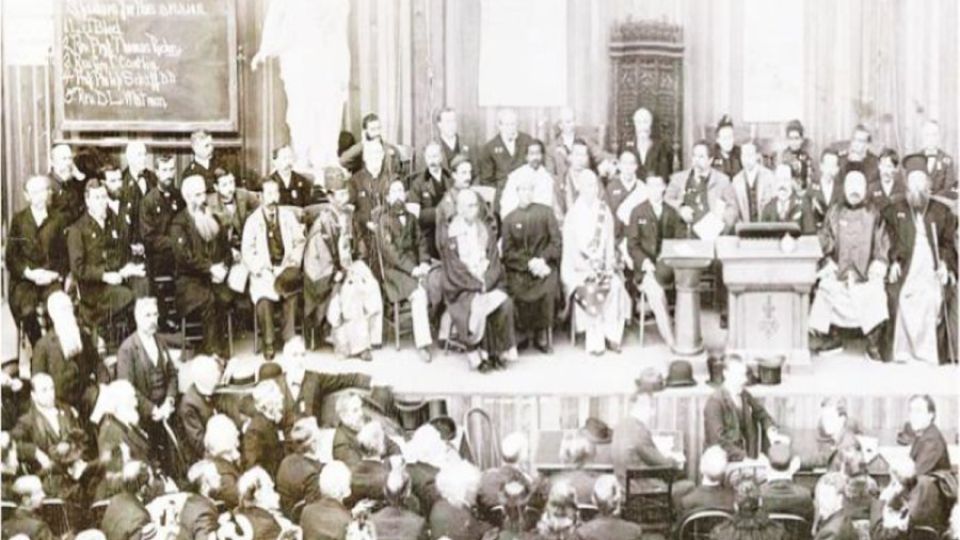December 12, 2022
NEW DELHI – After two hundred years as a language used across India for government and Courts among other usages, English is not a foreign language. Recall that the best known and most illustrious Indians of the previous century had made English their language.
Swami Vivekananda speaking at the World Congress of Religions in Chicago in September 1893 in English (file photograph) cast a spell over all those present. His success in his talks that followed in America was such that in the early 1930s the US Congress was perturbed enough to consider passing legislation to check the spread of his followers. Ramakrishna Mission and Vivekananda Centres followed.
Nobel laureate Rabindranath Tagore won fame in the United Kingdom and much of the Western world and South America, especially Argentina, because of his felicity with English. The same was the case with other Indian Nobel laureates, C V Raman, Chandrashekhar and Hargobind Khurana.
The Theosophical Society founded in Adyar in 1875 by Helena Petrova Blavatsky, Henry Steel Olcost and others saw its centres spreading throughout the world till about 1940. Jiddu Krishnamurti (1895-1986) influenced Shaw, Nehru, Miller and Huxley among others.
Swami Yogananda Paramahansa came to USA in 1920 where he founded the Self Realisation Society. His book Autobiography of a Yogi (in English) that sold tens of millions of copies worldwide greatly spread Yoga. It was taken forward in a major way by B K Ayengar’s yoga centres and Maharishi Mahesh Yogi’s Transcendental Meditation. All are functional and spreading.
Sri Aurobindo, the sage philosopher, wrote his masterpieces, most notably Savitri, in English. Pandit Jawaharlal Nehru’s mastery over English was such that a well-known critic wrote there were no more than six people in the world who could write English as well as Nehru.
Dr. B R Ambedkar, Dr. Rajendra Prasad and so many members of the Constituent Assembly made great speeches in English to make their point. Practically all names taken earlier were great nationalists, freedom fighters, spiritual leaders, writers, scientists, and great masters of India. Several of them were recognized as intellectual giants on the world stage. Their presence enriched India. All of them made English their own language and spread awareness of India’s Indic heritage.
Modern day English literature and writings have again brought Indian writers to the fore. Salman Rushdie, V S Naipaul, won awards for their writings in English, followed by equally great writers like Amitav Ghosh, Vikram Seth and so many others. India stands enriched endlessly by its ability to imbibe the culture, tradition, and languages of all those who came to Hindustan as conquerors as well as those seeking refuge.
Jews and Parsis come immediately to mind. Likewise for languages. Farsi was the court language of Maharaja Ranjit Singh whose empire spread far and wide. The famous Zafarnama written after the Battle of Chamkaur by the Dasam Padshah in 1704 to Shahenshah Aurungzeb was in Farsi.
Nobody referred to it as a foreign language. It continued to enrich Urdu and Hindustani that became the lingua franca in the subcontinent north of the Vindhyas till 1947 and beyond before Urdu started becoming Arabised and Hindi Sanskritized. It is only natural that a Hinduleaning government in power would want to promote Hindi and Sanskrit in its own right. But it should not do so at the cost of existing richness and diversity of India.


